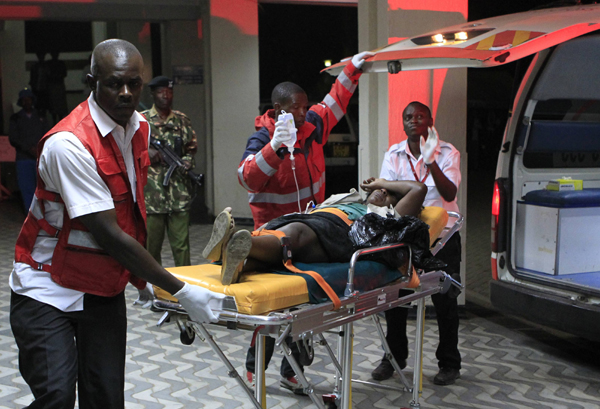Six die, scores hurt as triple blasts rock Kenyan capital
 |
|
An injured blast victim arrives in an ambulance at Kenyatta National Hospital in Nairobi on Monday. Noor Khamis / Reuters |
At least six people were killed and scores injured in three almost simultaneous blasts in the main Somali district of the Kenyan capital Nairobi on Monday, police said.
"We are here at a crime scene. Of course we suspect it is a terrorist attack," Nairobi police commander Benson Kibue said.
"The injuries number 25. They are in various hospitals, and we have retrieved six bodies," he said.
The blasts targeted two small restaurants and a clinic in a particularly densely populated district of Eastleigh, an area often known as Little Mogadishu because of its predominantly Somali population.
An Associated Press reporter at the scene said two of the blasts were about 200 meters apart. One explosion collapsed the first floor walls of a restaurant and appeared to have been caused by a device larger than a grenade.
Peter Gakuye, who was left bloodied and covered in dust by the blast, said he was at the front counter of a hotel called Sheraton - not related to the global chain - at about 7:30 pm when an explosion went off outside. He was unable to give any additional information.
Police were trying to establish the type of explosives used, and Kibue said one of the blasts may have been caused by a homemade bomb. Witnesses at the scene of the different attacks said one or more grenades were thrown.
Rescuers wanted to retrieve body parts after the biggest blast, but police, present in large numbers, cordoned off the area and were searching for further explosives, an Agence France-Presse photographer said at the scene.
The blasts came as people were returning home for the evening, some stopping to eat.
In recent years Eastleigh has been the scene of several explosions usually attributed by police to Islamist extremists.
Monday's attacks came a week after six people died when assailants burst into a church near the port city of Mombasa and opened fire on worshippers.
The attacks have taken place amid heightened warnings of a threat of Islamist violence in Kenya and despite increased security in major cities.
A suspected assailant was killed on Sunday when an explosive device he was making blew up in his face in a residential district of Nairobi.
The discovery last month of an explosive-laden vehicle parked at a police station in Mombasa, and the disclosure that police only searched it six days after impounding it and arresting its occupants, added to the climate of insecurity.
Kibue assured the public that those behind Monday's attacks will be brought to justice.
"Rest assured, whoever has done this thing, we will get them. There is no need to panic. We are on top of these issues," he said.
Kenya has been hit by a series of attacks since sending troops into southern Somalia in October 2011 to battle al-Qaida-linked al-Shebab insurgents.
The Islamists claimed responsibility for the deadliest attack, in which they laid siege to an upmarket shopping mall in Nairobi in September, killing at least 67 people.
Dozens of smaller attacks, most of them in the capital, on the coast or in eastern and northeastern regions bordering Somalia, have been attributed to al-Shebab sympathizers.
AFP-AP



























